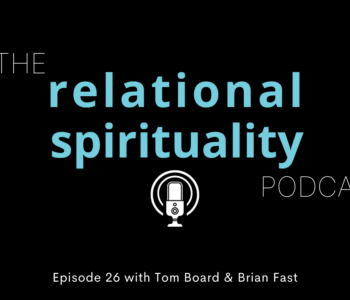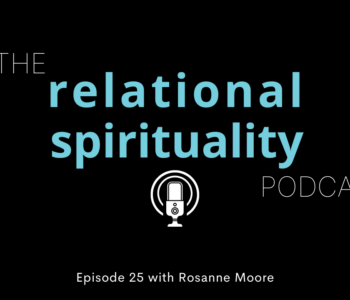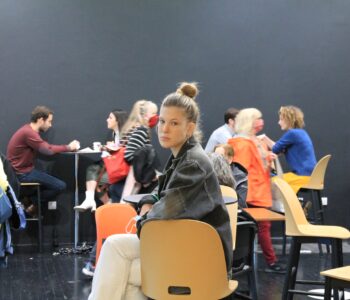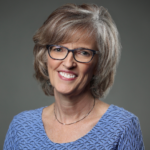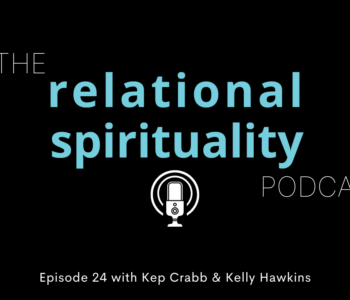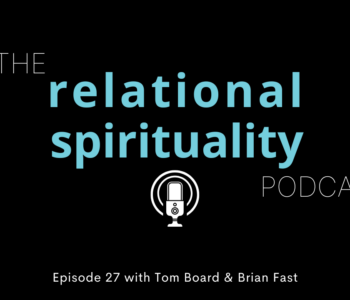 Message
Message
Counseling From the Other Side: A Look Into the…
A SOULTALK conversation with 2 counselors who have been counseling for many years. We chat about what goes on inside a counselor as they work with people. What do you do when you don’t feel the Spirit’s guidance and don’t have any place to go? How has this profession impacted your personal lives?
Bio:
Brian Fast : Dr. Brian L. Fast, PsyD, is a Licensed Psychologist in New York state, graduate of the University of California, San Diego and the Rosemead Graduate School at Biola University. He served as President and Clinical Director of CCAHope from 1986-2022 with specialized training and experience in short-term dynamic psychotherapy and an evangelical model of spiritual direction. He continues to serve part-time at CCAHope as a counselor and spiritual director. Special interests include marital counseling; growing men’s relational understanding and courage to husband and father well; and offering spiritual direction to individuals at all levels including pastors and ministry couples.
Tom Board: Tom Board graduated from the University of Illinois in Civil Engineering and became a Christian through the Navigator ministry there. In 1989 he received a MA in Biblical Counseling from Grace Theological Seminary in Winona Lake, Indiana. He served the Navigators for 46 years as a staff trainer and counselor. Tom has been in private practice since 1990 in the Denver area. His personal life and his thinking about change occurring in the lives of people has been most influenced by the 21 years he and Jenny were privileged to be in an intentional spiritual group with Larry and Rachael Crabb.
Links:
Reading & Relating book club
Transcript
Kep Crabb: Welcome to Relational Spirituality, a Larger Story podcast. I’m your host, Kep Crabb. In this quarter of Relational Spirituality, we’re going to be discussing themes and topics from the book, SoulTalk. So today, without any further ado, we want to dive into part two of our conversation from last week with two seasoned counselors, Tom Board and Brian Fast. So here we are with part two, counseling from the other side, a look into the mind of a counselor.
Kep Crabb: That was one of Dad’s favorite passages and the focus of that is the stirring up. What do we do now as we stir up each other. Tom, I’m interested to know with you and Jenny, obviously you’re not in a small group with Mom and Dad anymore. If you are, I’d like to sit in on that one with you for a while.
What are you guys doing for community now? I know all of us, and I know all of our stories a little bit, we’ve all had challenges with church and some maybe more severe than others but nonetheless challenges.
As you were talking, Brian, about the groups, I’m in a men’s group with two other guys that are 75 years old. I’m the junior by 20 years and getting a chance to journey with these guys has been really interesting for me. Obviously, I have the group with you, and I get a chance to do this with Rosanne all the time and talk with people in a deep way.
Tom, what are you doing? What are you and Jenny doing now for community in respect to some of that kind of stuff?
Tom Board: To put it in a context of just how we think about it, it goes back to your other question: what goes on for us when I’m working at my office, I’m coming home to be with my kids, my family, whatever it was.
Probably one of the things that has struck me over the years is that I have an opportunity all day long to be in relationship with people that the Spirit brings into my path. The difficulty is that all day long and every day I’m in different places internally, and that’s one of the things that I’ve had to get very comfortable with.
I think Jenny and I – this is going to lead into answering your question Kep – is that when we’re around people, sometimes people – that could be my wife, my kids, my friends, clients – they could be needing a million dollars from me internally, and I have maybe 20 bucks in my pocket. That’s all I have. Having learned a bit in this journey, it’s been very painful to learn this thing because I’m like Brian. As I mentioned before, I like to be competent. So to feel the incompetency and inadequacy in myself is always a temptation to try to manage the space.
What I’ve tried to learn to do is learn how to give my $20; how to give whatever it is that I have freely to those that are in front of me and who I’m with. That has been a very freeing thing relationally for us. Jenny and I are in that place that it’s not just about being in a particular community, though. We do have relationships with people. We’re part of a church, but it’s more of a mindset that we have when we’re ever around anybody. To try to ask the question, what is it that I have to offer and what can I give? It’s more blessed to give than it is to receive that very deep thought.
I go for developing community, even in our spiritual formation group. It took about five or six years to get really comfortable that we weren’t measuring ourselves or being overly self conscious about what’s going on inside to really just give what we could give, and if it wasn’t going anywhere to relax with that and to get very comfortable with ourselves in a place where we’re trying to actually listen to what’s going on inside of us. That’s how I’d respond to it because I think it fits together as far as just the whole way we look at relating.
We’ve got about five or six couples and we’re not in a formation group where we just have five or six couples that we’re just close to. These are people that are around the country that we can just talk to at any time. And we do. I don’t think we’ll ever be able to replicate what we had with Larry, that’s just not going to happen. He brought a certain sense to that, but I think each of us that are in the group we know that we have something to offer to the people that we relate with, so we just try to give that.
Church is a little different. We have a few people at church, the pastor and the executive pastor and some other people in the church, are journeyers, and so they are messy people, and we can relate at a messy level, which just opens all sorts of doors to really talking about our lives in really good ways. That’s been a real encouragement for us.
Brian Fast: I just have another thought about the link between work life and home life that you brought up, Rosanne, and how we manage. I just have a distinct impression of the Lord showing me that He wants me to be a better husband than I am a counselor.
I was once pretty nervous ahead of a session. Not that that’s an unusual or isolated event, sometimes I am nervous before sessions quite often, but just in particular, I was anxious that it went well, anxious that I got out of the way. I prayed, Lord, please help me to get out of the way. You’ve got it. If you’re not in charge of the session, nothing good is going to happen. I submit to you. I was on my knees actually, in my closed office, praying that way before I went down the hall to greet the client. When I put my hand on the doorknob to open my office door to go out to greet the client, as I started to open the door, the Lord impressed on my heart. Brian, why don’t you pray like that on your way home?
It was a question, actually, why don’t you pray like that on your way home? Because my false self is I want to show up as a good counselor, but I take it easy at home and assume everything’s going to be fine at home without that kind of energy and dependence on the Spirit.
The Lord really, in a good way, convicted me that He wants me to rely on Him as much or more for how I come through the door to greet Jean than how I go through the door to greet my clients.
Rosanne Moore: That’s good. That’s really good.
Kep Crabb: Dad used to say, my commitment to my wife is not to be a good husband. He said, my commitment is to the Lord, and out of that, you will be the beneficiary of me being a pretty good husband, I’m hoping but that’s not my goal. Reminds me of what you were talking about there.
Sorry, Rosanne, you were going to say something.
Rosanne Moore: I was just thinking in those primary relationships, there, I’m sure the people that you serve as a counselor, both of you. Tom, Kim Berg is a friend of mine and she’s talked about the impact you had on her journey after she lost her son. I know both of you make a tremendous impact with the people that you serve, but the reality is in the primary relationships of your life, nobody else can replace the role that you have. People can get another counselor, they can’t get another dad or husband. It’s important to have that same level of dependency as you were talking about, Brian. Yeah.
Tom Board: Absolutely.
Rosanne Moore: That’s good.
Tom Board: Second year of my counseling practice, I came home one night – this is just another story going along with Brian’s, it’s the same thing. It’s just the Spirit working, but in unusual ways, and this way was through my wife. I walk in the door and she says, very kindly, Tom, you give yourself to your clients all day long, and then when you come home, you don’t have much for us. And then she just walked away. My first reaction, of course, is very defensive, just not all that godly. You’re like, what do you mean? But as I pondered, I realized that there’s really something true about that. It led me to a dilemma. I have to think differently about coming home because I was splitting up my work life and my home life and realizing that I wasn’t being congruent with myself. That I was offering not the best parts of me to my family. Even if it’s that 20% again or whatever it is, would I be willing to give it? That was a big learning lesson for me of just struggling with trying to be there for them.
Rosanne Moore: To a certain degree, I think with everybody else, regardless of what kind of work you do, you can put your best foot forward and you can distance yourself when you don’t have bandwidth to do that. But at home they’re going to see the cracks like nobody else. There’s a very real grace that God offers us by giving us people in close enough proximity that we can’t hide from. Because that is what makes us feel our desperation and our need for Him more than anything else.
Kep Crabb: Which is really my main point, which I’ve always wondered just in talking to you guys a little bit and also with Dad. When your internal world is not in the place where it should be, I can’t imagine, not just talking to someone else about their lives, but everything going on. I’ve had friends go through divorces and I think their productivity at work has to be zero because they just can’t focus. They’re just preoccupied with what’s going on and so focused on that, that it takes them away from being able to lean into something else. That’s where I’ve been with Kimmie.
I think you’re so right. Rosanne, nobody sees us like our spouses or those who have those primary relationships. I live with this woman and she sees the best and she sees the worst. She still accepts me and is with me and I’m just so grateful. I’ve had so many conversations with these guys. Tom, you and I had breakfast a little bit ago and got a chance to share some things with you that were really special.
It’s just fun to have people that I can still chat with that are older brothers of mine that in many ways remind me of Dad. That’s just such a privilege for me to have you guys around in that way and getting to know Brian and Jean and the group that we’ve been a part of now for almost two years. God’s doing something. I feel it. I really do. The Spirit’s movement this weekend was palpable. I’m just grateful to chat with you guys today.
One other thing as we continue to talk, I’m looking at what Dad was talking about in SoulTalk. He says to understand the battle going on within us that hinders that SoulTalk. What gets in the way of that? How can we identify that? Releasing your passion for God and igniting that passion in others. That’s what Dad did so well and continues to do to me even on the other side. Trade in the passing pleasures of this world for lasting joy. Trade that in. I think one of the things that has impressed me in the last little bit is how fleeting this world really is. I was saying to Brian, we had such a good time this weekend, but if that’s as good as it gets, I don’t know if that’s enough, there’s more, we want more. We’re built for more.
That’s why I think Dad often wasn’t very happy. He wanted more. You got to see that a lot, Tom, be part of that group with him and got to experience that. How has that small group impacted the way you husband Jenny?
Tom Board: Jenny and I have always been really close to your mom and dad in the years that we’ve been together. Part of it is that even though we’re different people, we have a very similar relationship in the sense that both Jenny and I and your mom and dad had a lot of freedom to be able to talk about what’s going on inside and to be able to really be our worst with each other.
One of the things that I’ve had the privilege and the terror of early on in our relationship with your dad is I’ve seen him at his worst with your mom. When he was just madder than a hornet and not in a good way, there was nothing drawing to that at all. That didn’t actually freak us out because, the first year that we were in the program one of our first counselors described Jenny and I as two volcanoes living in the same house. We are very expressive people, that is not an issue. So to see that in your mom and dad, it didn’t freak us out, but it made us aware that they were both free with us to be that way in front of us. Then to also watch them work that stuff through, I can actually say I saw your dad radically change over those 20 some years in his relationship with your mom, with Rachael. I think a lot of it was the things we’re talking about, I think he really began to become a lot more internally reflective on what was going on inside of him. I don’t think he was asking your mom to be different. I think he realized, I can see her differently, through a different lens.
That’s a bit of a journey. Jenny and I have been married almost 47 years. It takes a while to get to that place where you really begin to say, what is it that’s going on in me that does not see my spouse through God’s eyes and loving her, seeing all the flawedness. I’m very aware of Jenny’s flawedness as Larry was with Rachael. Somehow, seeing the beauty that was there and staying with that in spite of all the other things we’re seeing, that’s not something easily discovered. I think it’s all kind of a messy journey to get to that place. I got to see that live in him. I think Jenny and I got to trail behind, trying to work on that stuff as they’re out in front of us working on the same stuff.
Kep Crabb: Dad said to me one time – Brian, I’ll let you respond real quickly – he said to me, at my funeral, I don’t want everybody to get up there and say good things about me. I want to hear what you just said, Tom. I had the same story. Dad and I got into a little bit of an argument and he got very frustrated with me and you saw some of that come out. The next morning I addressed him and I said, Dad, can I tell you how that impacts me? Which, of course, is his question that he asked people. I knew he would say, absolutely, please do. I said, it just makes me so hopeful, because I see the most godly man I’ve ever known acting like a five year old spoiled child. He just sat there and went, yeah. Didn’t say a word. It was so hopeful because I know that’s in him, which means, I know it’s in me. That’s in me in abundance, but it’s in him too, even in those stories, and that’s great. Brian, you were going to say something, my man.
Brian Fast: One of the things I was hoping to hear is just what Tom was saying about what the community was like in your small group with Larry. Rosanne, you put it so interestingly, you said it’s a grace to be in close relationships where we can’t hide what we’re really like. Larry and Rachael were in a relationship with Tom and his wife like that.
On the one hand, they can’t hide, on another hand, Tom, you said that Larry was willing to be real there. He didn’t try to hide. He just worked it out in front of you. It brought me back to one of his famous phrases, which is: the core essence of what transforms us in the Christian life, the way we experience grace, is looking bad in the presence of love. You guys could look bad to each other in the presence of Christ’s love and forgiveness and one another’s love and forgiveness. It’s a very precious commodity in our world. It’s rare that people can let their false selves down and be what they’re really like and encounter grace together.
Rosanne Moore: That stirs a question for me, for you guys as counselors, because I see a lot of times in Christian circles where we know the “right answers,” right? We don’t bring our story, we bring the right answer or we bring the right answer to somebody else’s story. Which that’s even worse. That can be such a barrier to genuine relationship, to genuine growth, where people respond to something out of what they know is the “Jesus answer” instead of actually being willing to engage their own story and its brokenness and to bring that. Not just a blanket, I’m just a sinner to save by grace, but actually looking at, I know that I have a habit in this area when someone treats me in this particular way, these are all the messages that start going through my head, then I easily react to that instead of responding to it and being able to talk about that honestly with other people.
I have a group of 3 women that have been wonderful because I made reference to it in the podcast that is going to drop tomorrow which, by the time this airs, will be last week. We’ve been on this journey of trying to buy a house, and this is the 5th time in 14 years that we’ve tried to move. We’re currently in a hundred year old house. We’re in limbo. My kids are allergic to it. There’s just so many reasons we want to get out of this. I can’t tell you the number of times people have said, it’s okay that that perfect house fell through because God has something better for you. I just want to throw things wherever they say that.
Brian Fast: I’m sure you do. It’s not helpful.
Rosanne Moore: It is not helpful. Do I believe that God sees the bigger picture and that he’s doing work in us? Yes, I believe all of that, but I’m also tired of living in boxes and all the limbo and all of the stuff. I’m so grateful for my three friends who have let me rant and cry and be self pitying and all of the things that I’ve done, all the places I’ve been, and have been able to sit with that, and still be able to believe that God’s doing something bigger than the demandingness that I feel in the moment, that there’s more to what He’s creating in me than the part that is resentful or self pitying or doubting, whatever’s up in the moment.
So my question for you is – I know part of this is just the work of the Holy Spirit – but when you’re dealing with people who are bringing the truth of scripture instead of the truth of themselves, what do you do with that? What goes through your mind as you’re having those conversations?
Brian Fast: One thing that – I was hoping that we could talk about this – Another context that I’ve been living in the past year is leading two spiritual formation groups for pastors.
Rosanne Moore: Oh yeah. I bet you run into it there.
Brian Fast: When somebody’s sharing their story, guess what other pastors want to do? Exactly that. Give advice, read a scripture, share an encouragement, but it’s really not encouraging. What we’ve come to do – this comes out of some influence from two other colleagues in my counseling center, Paul Caprera and Perry Sherman, who are part of a Men at the Cross organization that I’ve gotten involved in lately. It’s helped a lot. One thing they say, as you’re trying to build community or safety in a group, no advice giving. When you’re sharing your story, Rosanne, we would call that giving the gift of your story. We honor that. If somebody else starts to give advice, we say, hold on a second. Rosanne just gave the gift of her story. If you’d like to give the gift of your story and say something that’s coming up in your life, that’s great, but if not, save the advice, it’s not helpful here. It requires some relearning, but when the advice doesn’t happen, and somebody goes, I hear you andI’ve felt that way before, just empathize instead of taking over the conversation, it helps the group feel much more safe. It helps the community be more trinitarian, and be more “Real Church.”
Kep Crabb: Dad was never a formula guy. I love what you’re saying, Brian, in respect to some handles that maybe can give you some guide rails as you’re doing that.
Is there anything else that you guys can think of in respect to those guide rails? One of those things is don’t give advice, like you just said, Brian, other things that you guys might think of in respect to a counseling session of things that maybe you wouldn’t want to do or would want to do in respect to some of those guide rails or guideposts?
Brian Fast: Another in the same kind of place in my head is, be aware of what’s going on in you. We give advice because we’re not aware, we’re anxious and we’re just trying to take care of ourselves. But if we could stop and just be aware, this is making me uncomfortable, and be willing to say that rather than manage our feelings by giving advice.
Tom Board: Another one that I would add as I’ve supervised a lot of counselors is, that there are a lot of times – taking what you were saying, Rosanne – when people tell stories that you become really aware internally, I have absolutely no idea where to go with this. I have no idea what to say. I don’t know. What’s important, and the rule of thumb that I share with people, when you’re in a place where you really don’t know where to go, be curious, ask a question, keep going with it and you never know. As a person starts talking more about where they’re at, the Spirit of God can begin to whisper something in your ear as far as what might be a thought to move into that person, because if you can’t see a place to move in, you don’t push your way in.
You’re gently trying to listen more to find – one of the phrases Larry used many years with me is – find the subtlest crack where someone opens a little bit of their soul that you can enter into. Many times when people tell stories, they’re so pissed off, there’s no crack. They’re just pushing you away and there’s no place to get in.So you have to be very comfortable with the fact that there’s not an invitation to come in, but you never know when you ask another question or you’re a little more curious, maybe something softens and you find a little place where you can begin to enter into that kindly to learn more about what’s going on inside of them underneath all the struggles that they’re feeling at that place.
So that would be my thought.
Kep Crabb: That’s so good.
Brian Fast: I love that phrase, sacred curiosity. If they give you the crack, sometimes it’s just a simple matter of saying, can you say more about that? Can you put some more words to that? That’s all that’s needed. Then the crack opens wider.
Kep Crabb: What’s interesting, Tom, you said that when Dad wrote SoulTalk in the early 2000s, that’s when you started to see a little bit of that shift in respect to relating like the Trinity.
Tom Board: That’s correct.
Kep Crabb: That’s really what you’re talking about now, which is why we thought this was so appropriate to have you guys on as we introduce SoulTalk to the Larger Story crowd.
We’re going through a bunch of different books and this was one that I think was the beginning of Dad really moving in – actually the follow up to connecting to some degree – but of what it looks like to have conversations that matter. That was a phrase that he loved.
Brian, we had some of those this weekend. It was really powerful. This has just been really fun to get a chance to chat with you guys. I appreciate both of you so much. I certainly appreciate Rosanne. I get to work with her every day, but to see you guys here and get a chance to pick your brains.
Is there anything else, Rosanne, that you can think of as we get ready to close with these guys?
Rosanne Moore: I am curious. We talked a little bit about the challenge of what’s going on in you while you’re sitting with somebody and then how do you take that and go home. The more you’ve learned to be present and aware in the moment and open handed, has that made it easier to go home and to not bring work home in a difficult way?
Part of what I’m thinking as I ask this is, I have a daughter who’s planning to go into counseling. One place where she gets caught when she has conversations with people is, she rehearses the conversation in her mind afterwards and she’ll get caught in thinking, I should have said this or I should have asked this or I should have done better. One of the conversations she and I have is, you can’t control this. You can be present and you can be sensitive to the Holy Spirit, but there’s not going to be a right way to do this. As you’ve learned to let go of that in your counseling, has that made it easier to come home? Or does it not necessarily translate that way?
Tom Board: One of the things I can say, when I got out of the counseling program with Dan and Larry, they were very clear that leaving the program, you’re not actually very good. You’re going to suck at being a counselor for at least five years. One of them said to me, it’s the only profession I know that the only way to get better is to fail. Meaning that you’re going to be with people, and you’re going to fail. You’re going to be self absorbed and you’re going to be lost in yourself.
It creates the opportunity – that’s why I say good supervision can be very helpful. Not the kind of supervision that’s trying to help you understand what’s going on in your client, but the kind of supervision that asks you a question, what’s going on in you as a counselor, and to begin to understand all the different things that are happening in you so that you can actually be more present.
That never ends. Frankly, I struggle with an incredible amount of entitlement. I’ve worked really hard for nine hours, I want to come home and I don’t want to talk to or think about anybody else, and God has often convicted me about that place. It never goes away. It’s always there. I think getting comfortable with this journey is never actually easy. What it is, you get more familiar with the reality of it, and therefore, you become a little more comfortable with the struggling of it, but it’s not pleasant. It’s work all the time.
Brian Fast: Yeah, it’s very exposing of your weaknesses. I think of a couple of things when you’re thinking of going home afterward, you can have two different things you’re carrying. One is regrets about, I could have said this, I should have said that, or why did I do that? And the other is just the weight of what a person has shared with you, and the struggles that people go through in life. With the struggles people go through – I started by saying that I learned you really shouldn’t pray as you start to counsel, and I don’t believe that. I pray all the time. Particularly, I pray at the end of the session. I like to save maybe five minutes at the end to say, okay let’s take some time and pray.
One person a long time ago shared with me his perspective on counseling as, counseling is informed intercession. Spend 45 minutes hearing what’s going on and five minutes interceding. There’s other models, but that helps me as a counselor to say, here’s what I’ve heard. I just want to bring you before the Lord together before we leave. I think it helps them. Often there’s tears and what I’ve prayed has helped, but it also helps me because I’ve cast my cares on the Lord and I go home lighter session by session because of that.
The other one about what I could have done differently, or regrets of what I said. Pastors will say this: they’ll give a sermon and they’ll think they made a mistake. They forgot a line or misquoted the verse, but when people talk to them about what impacted them from the sermon it has nothing to do with that.
It’s often the same with counseling. Somebody will tell me, I’ll see them years later, or a couple of sessions later and say, what you said really impacted me. I couldn’t wait to hear what they said. It was never what I hoped they would say. It was not the great insight I thought I had, it was something else. It was just something spontaneous and God uses it.
So even with your daughter, she might think she’s messing up here and there, which we all do, but God uses things that we’re not in control of and I think it’s good to know that He’s going to be at work, whether you know it or not, and sometimes in very unexpected ways.
Kep Crabb: The Pressure’s Off as we engage in SoulTalk.
Tom Board: Amen.
Brian Fast: Yeah.
Kep Crabb: I love that Brian, it’s beautiful.
Rosanne Moore: That’s what I’ve told her before. You’re kind and you’re wise. I can’t imagine that the person didn’t walk away better from having talked to you, even if you didn’t say all the right things.
Brian Fast: It’s great to hear your vision of her.
Kep Crabb: I love the notion of the pressure’s off in the sense that there’s really nothing that we can do. I think what you just said there, Brian is. when you expect to have the most impact, that’s probably when you have the least. When you feel like you’ve had the least impact is probably when you’ve had the most.
Brian Fast: Often.
Kep Crabb: Often, yeah. That’s the way the Holy Spirit just says, I’m the one here who’s doing the heavy lifting, you just you just stay on track.
This has been really fun guys, to be with y’all. I just really appreciate your time. What we’re trying to do with Larger Story is, what does it mean to relate like Jesus to people and how to put Jesus on display. Dad gave us an example of that in so many different ways that continue to linger, I know with me and I know with you all as well. Thanks for joining us today, guys.
Tom Board: You’re welcome.
Brian Fast: Thanks for having us.
Kep Crabb: Join us next week for our next one. If you don’t have a copy of SoulTalk, go to largerstory.com and get yourself a copy today. Thank y’all.
